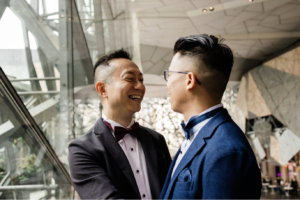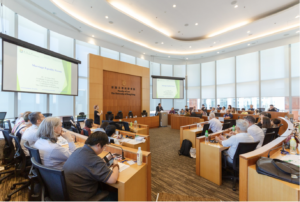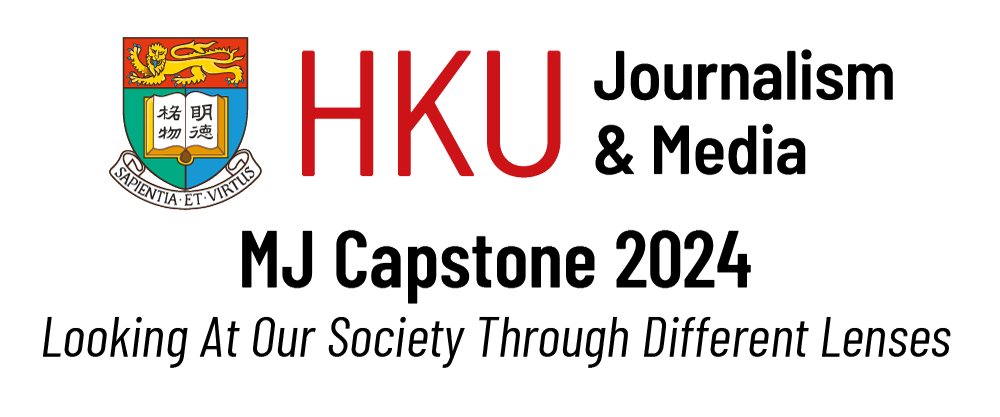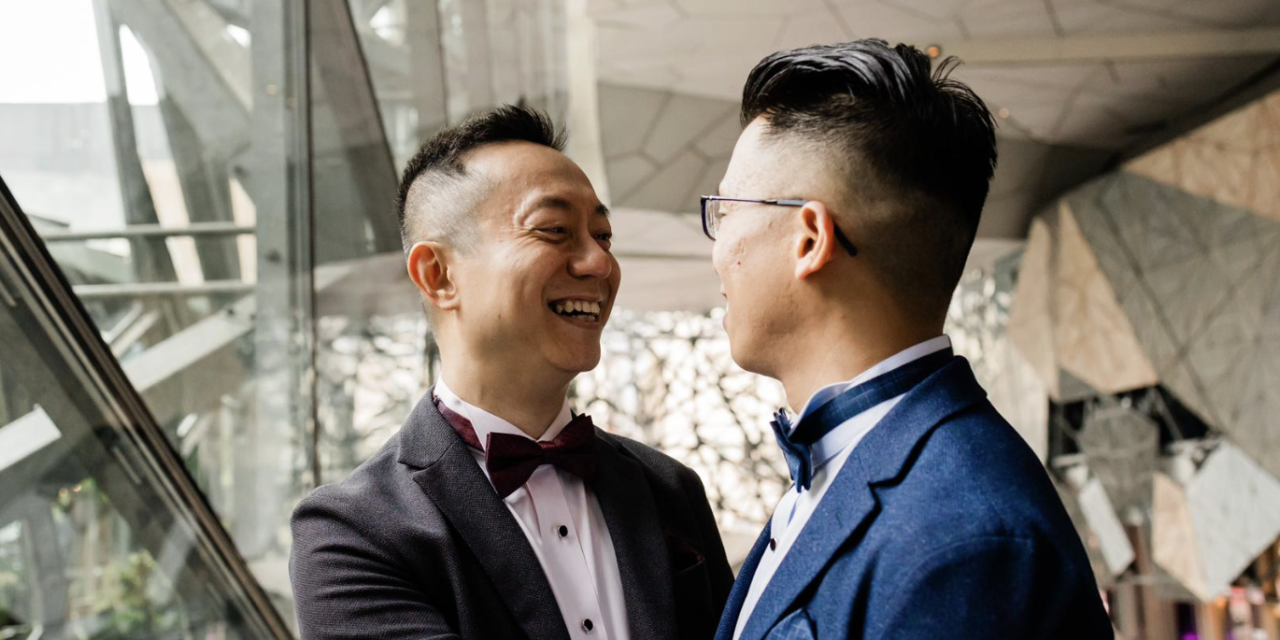By Peter Guo
HKU Journalism and Media
The city’s top court ordered the government to create an alternative legal framework for same-sex unions by 2025, but the LGBTQ community is not sure this will happen and wants full recognition of marriage ultimately.
HONG KONG – Ivan tied the knot with his boyfriend of 11 years in September 2023 in Hong Kong. The couple registered their union via Zoom with the American state of Utah, which provides such a service. After that, they also held a celebration surrounded by friends, just like any newlyweds.
Despite a joyful ceremony and congratulations from loved ones, their overseas matrimonial certificate is not officially recognized in Hong Kong. They still cannot enjoy the rights and benefits heterosexual couples have, including those in housing, wills, and medical guardianships.
The city has yet to pass laws to legalize same-sex marriages or recognize such unions.
“Why can’t a Hongkonger have such a marriage openly and without shame in our own place? … For us, this is the biggest issue,” Ivan, who wants to use a pseudonym to protect his privacy, said, referring to the lack of marriage equality in the former British colony that returned to Chinese sovereignty in 1997. “We may consider immigration because it seems to be the only possible way forward.”
The city’s Legislative Council deliberated in 2008 that recognition of any same-sex relationships should only be introduced when “consensus or a majority view was reached by the society.” This stance has been maintained ever since.
But public attitudes in Hong Kong toward sexual and gender minorities have become much more liberalized and accepting in recent years.
In 2023, 60% of Hong Kong people backed legislation for same-sex marriage, up from the 38% a decade ago, according to a survey conducted by three universities. The city also hosted Asia’s first Gay Games last year.
Also last year, Hong Kong’s top court ruled against legalizing same-sex marriage but ordered the government to formulate an alternative framework to recognize same-sex unions and protect the core rights of gay couples within two years.
The Court of Final Appeal said the government “is in violation of its positive obligation” by not having a proper system to recognize same-sex couples outside of marriage.
Therefore, in the next two years, all eyes will be on Hong Kong to see what specific form of legal recognition for gay couples will arise from the court ruling and whether the city will become the next place in Asia to legalize same-sex marriage, even if such a prospect appears dim across the border in mainland China.
While some are worried Hong Kong’s government will not meet the demands of the court ruling, especially given opposition from local conservative religious groups, others are concerned it will only recognize same-sex unions and not grant equal marriage rights.
Still, others are cautiously optimistic the government will do the right thing.
The plight and the progress
As of now, same-sex couples in the city only enjoy limited rights granted by individual court cases, including the right to apply for public housing together and to qualify for dependent visas.
In other matters, they still face a lot of institutional constraints.
For example, Ivan can’t make decisions for his partner in a medical emergency, even though he thinks it’s “very crucial” to be able to do so.
“It’s only the two of us who truly understand the other’s desires and wishes,” said Ivan.
Moreover, under current laws, the apartment Ivan and his husband purchased together five years ago is not considered a jointly-owned property. Therefore, they had to sign an agreement outlining how the property would be handled if they are separated or if one of them passes away.
“It may not have any specific legal validity,” Ivan said, explaining that they didn’t consult a lawyer, to save money.
Meanwhile, some say they have personally felt the progressive shift in public opinion.
“On the street, I think I am not afraid or I’m not feeling uncomfortable anymore to hold hands with my husband,” Paul Choi, a human resource specialist, said.

Paul Choi married his partner in Melbourne, Australia last September. Courtesy: Paul Choi
Choi, who married his long-time partner last year in Australia, said there is a certain level of societal acceptance of their marriage. For example, some businesses, like the gym they go to, extended his membership to his husband once they showed their marriage certificate, and they were able to buy medical coverage offered for same-sex couples from some insurance companies.
“But yet you have to find it,” Choi said. “It’s not a common product.”
“Do the whole thing” or “do it in a piecemeal fashion”?
Some people in the LGBTQ community, such as Choi, are anxious about what the government would do with the legal framework required by the court.
“The good thing is they have to do something. But the bad thing is maybe they will do something even worse,” he said. “We don’t know. So, we’ll see.”
Jerome Yau, a co-founder of Hong Kong Marriage Equality, the main NGO lobbying for legalization, called the court ruling “obviously significant.”
“It means they (same-sex couples) all deserve to live a dignified life,” Yau said.

Jerome Yau gave a talk about marriage equality in a corporate event in 2023 in Hong Kong. Courtesy: Jerome Yau
However, Yau stressed that an alternative legal framework possibly in the form of a civil union is a “lesser status” that’s no substitute for legalizing gay marriage, as it lacks clarity and may entail extra administrative costs.
“Even [if] you talk to a child, he or she knows what marriage is,” said Yau. “You start talking about something else. People start scratching their heads. ‘Civil union? What is it?’”
Instead, full recognition of same-sex marriage is the “gold standard,” Yau said, adding that many European countries that once tried some sort of registered partnership system all decided to opt for it in the end, for greater effectiveness.
While civil unions are mostly viewed as a “stopgap measure,” there is a need for a long-lasting marriage policy that provides clarity, Yau said.
“The most sensible thing to do is to aim to do the whole thing, you know, rather than just … do it in a piecemeal fashion,” he said.
“There’s nothing in our existing law or constitutional framework that would bar the government from recognizing same-sex marriage. If the government wants to do it, they can do it,” Yau said. “Hong Kong needs to do something. And let’s seize the opportunity and do the right thing.”
Potential obstacles
John Burns, a professor at the University of Hong Kong who specializes in politics and public administration in China, said that in his understanding, marriage equality is a “low priority” for the city’s leaders.
“Why rock the boat? officials may think, for a small insignificant minority,” Burns said, pointing out that some lawmakers in the Legislative Council loudly object to legalization and many government officials come from conservative education backgrounds.
Last year, some anti-LGBTQ lawmakers even tried but failed to mobilize people to ban the Gay Games arguing it’s a threat to national security. They also called for the resignation of veteran lawmaker Regina Ip for officiating at the opening ceremony. Ip, who is sympathetic to gay rights, said their claims about the event were “ridiculous.”
Beijing – the least of the LGBTQ community’s worries?
As the political dynamics for this issue are mostly local, Beijing will probably ignore it as long as same-sex legislation doesn’t impact security in Hong Kong, Burns said, adding that domestic opposition from vocal religious minorities and politicians is insufficient to undermine social stability on the issue.
Besides, letting the city handle the matter on its own is a demonstration of Hong Kong’s autonomy, to which the central government could point, to rebut overseas criticism that “One Country, Two Systems” is dead, Burns said, referring to the formula under which Hong Kong is to be ruled after its return to Chinese sovereignty in 1997.
Three possible options for the government
Faced with the court decision, the government has three options, according to Burns. One is to delay and do nothing, hoping perhaps that the court’s composition will change, given that CFA indicated it would consider giving the authorities more time if needed.
Another approach is to do the bare minimum – provide only for those rights already won through court battles, plus registration of the unions.
A maximalist solution may term the relationship a civil union – rather than marriage – to appease the opposition, but provide equality in every other respect.
Burns also criticized officials’ long-standing claim that there is no social consensus on the issue.
“Does this mean that we first need 100% popular approval of same-sex marriage, an absurd requirement?” Burns said.
“I observe that the government is prepared to push forward many policies without a consensus. Why such a requirement for this policy?” asked Burns.
So far, Yau said, the government has not consulted him. His group is the first and largest organization in Hong Kong advocating for marriage equality.
The Constitutional and Mainland Affairs Bureau, which is in charge of setting up the legal framework to recognize same-sex unions, cited the court’s judgment that freedom of marriage under Hong Kong’s Basic Law is confined to opposite-sex marriage only.
Instead, the Bureau said it would abide by the court’s order to work out an alternative framework for legal recognition of gay partnerships.
“The Government has been actively considering the appropriate follow-up actions in accordance with the relevant rulings of the CFA, including issues such as the eligibility requirements and the relevant rights and obligations to be conferred to same-sex partners under the alternative framework,” it said in an email reply to HKU Journalism.
“The sky hasn’t fallen”
To legislate same-sex marriage, Hong Kong needs “strong leadership” to tell people, especially those on the fence, that marriage equality and traditional values can co-exist, Yau said.
“Around the world, we have 37 jurisdictions recognizing same-sex marriage. And in those places, the sky hasn’t fallen,” Yau added.
Yau’s group has been trying to engage different stakeholders to explain why it’s important for Hong Kong to have marriage equality. Specifically, HKME spearheads Equal Love Hong Kong, an online coalition campaign, to mobilize support for same-sex legislation in the business community. A total of 112 companies across sectors, including the city’s flag carrier Cathay Pacific, have signed up to show their support.

HKME organized a Marriage Equality Forum with the Center for Comparative and Public Law of the University of Hong Kong in 2019. Courtesy: Jerome Yau
The organization also conducts research and conversations to understand why some people feel they are not ready to support gay marriage.
“People had fear,” Yau said, adding that some find it confusing and hard to understand due to conservative values. “They were not quite sure what it would mean when it comes to interacting with, let’s say, rainbow families.”
Can Hong Kong follow in Taiwan’s footsteps?
Some 450 miles away, Taiwan legalized gay marriage in 2019, two years after the island’s Constitutional Court ruled that its marriage laws were unconstitutional and ordered the legislative branch to grant freedom of marriage to same-sex couples.

The Rainbow Starting Line is located in front of Taipei City Hall. Photo by Peter Guo
“I believe the most important reason is the accumulated power of civil society over the years,” said Jennifer Lu, co-founder of one of the key groups that lobbied for legalization – Taiwan Equality Campaign, explaining that they have been consistently pushing the government to move forward. “The government won’t automatically implement reforms because no one is willing to risk their own stakes for it.”
In addition, she attributed the island’s ability to grant equal marriage rights to same-sex couples to a more liberal-leaning Executive Yuan led by its then Premier Su Tseng-chang, who is sympathetic to LGBTQ equality.
“Their team is actually quite skilled at managing this issue,” Lu said. “I do feel like who holds that position makes a significant difference.”
In February 2019, three months before Taiwan legalized same-sex marriage, Su said in a YouTube video that homosexuality is natural.
“I sincerely hope that everyone will tolerate differences and treat each other kindly,” Su said.
Even though the success of Taiwan cannot be simply copied and pasted onto other places, it can offer a model that is more adapted to the collective cultures in Asia as opposed to the individualized West, Lu said.
“The idea of fighting for one’s own rights doesn’t work well in Asia, and it can trigger a strong backlash,” Lu said, noting that many Asian countries place a strong emphasis on family reputation and how individuals are perceived by their parents. “It’s impossible to tell people to just disregard these values and live out a true self.”
She added that it often takes “the right time, right place, and right people” to legalize same-sex marriage in any given jurisdiction.
The right timing
Speaking of the future, Yau said sometimes things will happen because of good timing.
“How things would play out in Hong Kong, we just have to wait and see,” he said. “The earlier we have the discussion, the better.”
Despite uncertainties, Choi, the human resources specialist , said it’s important to have hope.
“It’s almost like a tango. So sometimes you step forward. Sometimes you step backward,” Choi said of Hong Kong’s LGBTQ rights.
For now, he and his partner are trying to be practical. They won’t consider whether they should remarry each other if same-sex marriage is legalized in Hong Kong one day.
“That’s too far,” Choi said. “You won’t plan for something that you don’t know whether it will happen.”
As for Ivan, he feels optimistic that Hong Kong can eventually achieve marriage equality once a more open-minded generation takes over, even though this might take some time.
Ivan doesn’t expect any substantial changes to come in the next two years, but he said he felt hopeful that Hong Kong will eventually recognize same-sex marriage. But before then, he and his husband will register their civil partnership once that option becomes available. .
“I feel very optimistic. I cannot say that it can happen within a short time,” Ivan said, referring to the chances of Hong Kong legalizing same-sex marriage. “Once our generation takes over, the problem will naturally fade away, and opposition voices will diminish.”
Advisor: Cindy Sui

